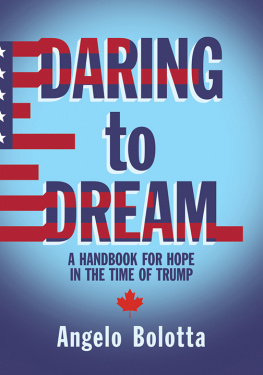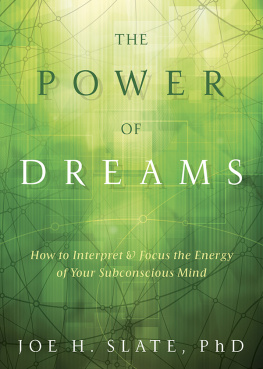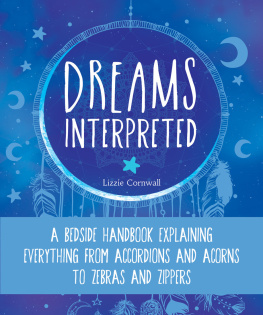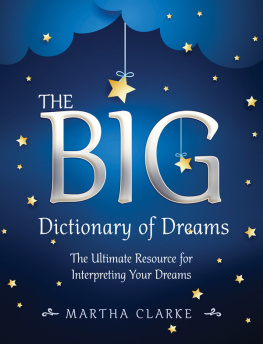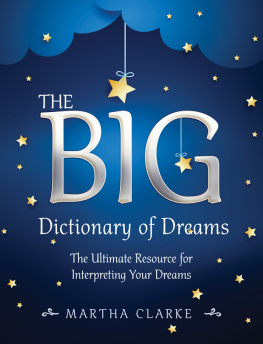DARING
to
DREAM
A HANDBOOK FOR HOPE
IN THE TIME OF TRUMP
MIROLAND IMPRINT 17
Guernica Editions Inc. acknowledges the support of the Canada Council for the Arts and the Ontario Arts Council. The Ontario Arts Council is an agency of the Government of Ontario.
We acknowledge the financial support of the Government of Canada.
DARING
to
DREAM
A HANDBOOK FOR HOPE
IN THE TIME OF TRUMP
Angelo Bolotta
MIROLAND (GUERNICA)
TORONTO BUFFALO LANCASTER (U.K.)
2018
Copyright 2018, Angelo Bolotta and Guernica Editions Inc.
All rights reserved. The use of any part of this publication, reproduced, transmitted in any form or by any means, electronic, mechanical, photocopying, recording or otherwise stored in a retrieval system, without the prior consent of the publisher is an infringement of the copyright law.
Connie McParland, series editor
Michael Mirolla, editor
David Moratto, cover and interior book designer
Kristiina Paul, photo researcher
Guernica Editions Inc.
1569 Heritage Way, Oakville, ON L6M 2Z7
2250 Military Road, Tonawanda, N.Y. 14150-6000 U.S.A.
www.guernicaeditions.com
Distributors:
University of Toronto Press Distribution,
5201 Dufferin Street, Toronto (ON), Canada M3H 5T8
Gazelle Book Services, White Cross Mills
High Town, Lancaster LA1 4XS U.K.
First edition.
Printed in Canada.
Legal Deposit Third Quarter
Library of Congress Catalog Card Number: 2018943219
Library and Archives Canada Cataloguing in Publication
Bolotta, Angelo, 1951-, author
Daring to dream: a handbook for hope in the time of
Trump / Angelo Bolotta. -- 1st edition.
(MiroLand imprint ; 17)
Issued in print and electronic formats.
ISBN 978-1-77183-341-7 (softcover).--ISBN 978-1-77183-342-4 (EPUB).
--ISBN 978-1-77183-343-1 (Kindle)
1. Social history--21st century. 2. Social problems. 3. World politics-- 21st century. 4. Social action. 5. Government accountability. 6. Political participation. 7. Social psychology. 8. Critical thinking and media literacy.
I. Title. II. Series: MiroLand imprint ; 17
HN18.3.B65 2018 | | C2018-902790-8 | C2018-902791-6 |
DARING
to
DREAM
A HANDBOOK FOR HOPE
IN THE TIME OF TRUMP
Acknowledgements
To Alissa, Alanna, and Mara
My wish is that each one of you experience the peaceful joy that comes with seeking truth and doing justice. In our artificially complicated world, there can be no greater gift than the satisfaction that comes from the realization that what you have done has made a difference in the lives of others. Know that your love and support have greatly helped me to become the person that I am today. In the life journey before you, remember to stay on the high road, regardless of the immediate cost. Believe me when I tell you that you will never regret it, when looking back.
To my many colleagues, students, and friends
Thank you for your support and encouragement throughout the years. Know that I learned much from our encounters and the honest sharing of ideas. This dialogue has been so important in shaping the contents of this handbook.
To young dreamers everywhere
Thank you for daring to dream. Thank you for recognizing that much can be changed for the better. Do not be disillusioned. Continue to dream in glorious colour. Stay focused on the prize and do not be afraid to work hard to make it happen. It might take longer than you expect. But then, evolution has long produced more lasting results than revolution. Do not let power and privilege crush or manipulate your dreams. All real power is latent. As any honest leader will tell you, the minute you have to resort to force, you have effectively lost power, not gained it. Never be afraid to speak truth to power and justice to privilege.
Preface
I vividly remember the events of October 1962, as if it were only yesterday. I remember almost two weeks of escalating tensions, bringing the world again to the brink of war. I did not understand exactly what was going on, but it became abundantly clear that what was happening, in the adult world, was not good.
I remember running home from school terrified one afternoon, while repeatedly looking up to the sky to see if Russian missiles were going to rain down on me, before I could make it safely home. I imagined pointed ballistic missiles striking me right on the top of my head. I was only eleven, so I did not have a grasp of adult realities like nuclear Armageddon and the material permanence of death.
I remember going through civil defence drills in elementary school which consisted mainly of one thing: In the event of a nuclear attack, we were instructed to hide under our desks and pray silently. Only silent prayer was allowed because we had to listen for further instructions from our teachers. Much as I trusted the Sisters of St. Joseph, who ran our school, I was not totally convinced of the soundness of this defensive strategy, based on what my elders had told me about the bombardments they experienced during World War Two. These new bombs were supposed to be much more accurate, powerful, and deadly!
I was a new Canadian, having immigrated to Canada from Southern Italy, with my mother, seven years earlier. I was happy in my new home. We had many relatives in America. I remember being riveted to the flickering, second-hand television set that my father had brought home one day. We lived in the basement of my fathers barbershop. Unlike some of my American relatives, we did not have a bomb shelter and we did not have the room to build one. Every inch of basement was already occupied.
My father had spent twelve years serving his country during various wars starting in North Africa and ending with World War Two. Each time he completed his obligatory military service, a new conflict would break out and he would be recalled to active duty. He did not talk much about his experiences of being under bombardment by enemy forces, but it did not take a rocket scientist to figure out that these new Russian missiles would be very different.
I remember watching flickering images of the youthful American president and a much older and meaner looking leader of the communist Soviet Union. They were playing a deadly game of nuclear chicken. It was not difficult to interpret the adult words we overheard, the fear on their faces, and the abrupt silence once we came into the room. The issue was the placement of Russian nuclear missiles in Cuba, a stones throw from the United States. The communist dictator of Cuba had requested these nuclear missiles to deter further aggression from the Americans.

